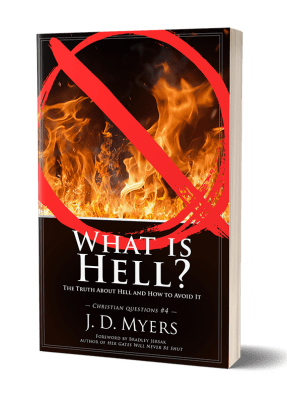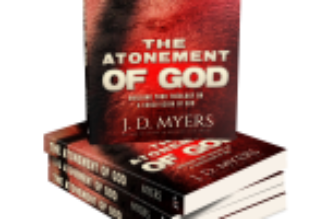 My book, What is Hell? is now available on Amazon. I am doing a series of podcast studies that focus on some of the content from the book. The studies look at the eight key terms that are often equated with hell, and about a dozen key passages that are thought to teach about hell.
My book, What is Hell? is now available on Amazon. I am doing a series of podcast studies that focus on some of the content from the book. The studies look at the eight key terms that are often equated with hell, and about a dozen key passages that are thought to teach about hell.
If you want to learn the truth about hell and what the Bible actually teaches about hell, make sure you get a copy of my book, What is Hell?
Also, if you are part of my discipleship group, there will be an online course about hell as well.
In this study, we will be looking at 2 Thessalonians 1:8-9, which refers to flaming fire of vengeance and everlasting destruction coming upon those who do not obey the gospel. This certainly sounds like a punishment of everlasting torture, doesn’t it? So what is Paul referring to?
Let’s begin by looking at the passage.
2 Thessalonians 1:8-9
… in flaming fire taking vengeance on those who do not know God, and on those who do not obey the gospel of our Lord Jesus Christ. These shall be punished with everlasting destruction from the presence of the Lord and from the glory of His power …
 When considered by itself out of context, 2 Thessalonians 1:8-9 seems to conclusively state that God punishes and destroys people forever with flaming fire.
When considered by itself out of context, 2 Thessalonians 1:8-9 seems to conclusively state that God punishes and destroys people forever with flaming fire.
As such, this text may be the strongest passage in Scripture to support the concept of eternal torment in fire for the unregenerate dead.
But an entirely different understanding emerges after a careful analysis of the text in its context and the numerous intertextual allusions to other passages in Scripture.
And since our previous studies on the topic of hell and everlasting fire have already considered numerous texts with similar terms and has shown that they do not refer to everlasting torture in the fires of hell but to some sort of temporal destruction, we are well-prepared to see what Paul meant when he wrote this text.
Paul is Alluding to Numerous other passages in Scripture
The first thing to consider is the numerous allusions and references in these verses to other passages of Scripture. When Paul wrote these words, he expected his readers to bring to mind the images of fire and destruction that are found in various prophetic texts and the teachings of Jesus.
For example, the terminology and imagery used in the preceding verse about Jesus being “revealed from heaven with His mighty angels” (2 Thessalonians 1:7) brings to mind the similar imagery used by Jesus in Matthew 13:36-43 and Matthew 25:31-46. Both of those passages refer to the destruction of nations and countries that ignore the ways of God and the plight of the needy in their midst. Since Paul is using similar imagery, he must have similar ideas in mind.
Furthermore, when Paul writes about “the presence of the Lord and … the glory of His power,” he likely has texts such as Isaiah 2:19-21 (cf. Revelation 6:15-16) and Isaiah 66:15-16, 24 in view.
This first text refers to the “terror of the Lord and the glory of His majesty” while the second refers to the destruction that comes upon those who sin against God. Yet it is critical to note that while the Isaiah text refers to the “terror” of the Lord, Paul removes the reference to terror and inserts the “presence” of the Lord instead.
This change is significant.
What does “from the presence of the Lord” mean?
The phrase “from the presence of the Lord” is key to understanding Paul’s point. Many books and articles focus primarily on the first word of this phrase. It is the preposition “from” (Gk., apō), and can refer to location or separation (away from), source or origin (comes from), instrument or cause (caused by), and time (from ages past).
But since the preposition introduces a longer phrase, we can know the proper meaning of the preposition by first understanding the phrase it introduces.
So what does the phrase “the presence of the Lord” mean?
In English, it appears to refer to that which is in proximity to God, or that which is near God. Therefore, to be in the presence of the Lord is to be near God. But the Greek terminology (and the Hebrew on which it is based) is much more vivid.
The phrase Paul uses could literally be translated as “before the face of the Lord” (Gk., prosōpou tou kuriou). This was a specific Hebrew idiom which referred to the honor of God.

In biblical times, the greatest cultural value was honor. People sought to gain and keep honor for themselves, their family, their country, and their god(s) while avoiding shame. In honor-shame cultures such as that of the ancient Mediterranean world, honor and shame are often symbolized by certain body parts.
The head, face, and right hand were symbols of honor, while the left hand, feet, and buttocks were symbols of dishonor (Malina, The New Testament World, 37-39; Neyrey, ed. The Social World of Luke-Acts, 34.)
When Paul (or any biblical author) refers to “the presence of the Lord,” or more literally, “before the face of the Lord,” they are not referring to God’s presence, but to God’s honor (cf. Jon 1:3; Acts 3:19). See my podcast study on Jonah 1:3 for a detailed explanation of this idea.
Further support for this idea is found in the fact that Paul also writes about the power and glory of God (2 Thess 1:9-12), which are closely connected with honor.
Therefore, when Paul puts the preposition “from” in front of this phrase, he is not writing about something that is located with God or comes from God but is instead referring to God’s care for His own honor.
Paul is writing about the negative consequences that come “from” neglecting the honor of God.
In other words, the preposition “from” is causal, but God is not the cause. We humans are the cause of the destruction, for we despised the Lord’s honor and suffered the consequences.
It is our responsibility and calling as the people of God to bring honor and glory to God through obedience to Him. If we fail in this, and bring shame upon God instead, we can expect to suffer for it.
The Suffering We Experience does not come from God
But note that the suffering and consequences which come upon humans for neglecting God’s honor do not come from God Himself, but “from the honor of God.”
That is, for the sake of His own honor, God has given instructions to humans about how to live and function in this world. These instructions are for our own good and to help us live life in the best way possible.
When we ignore these instructions, thereby forsaking the honor of God, we suffer the consequences, not because God sends the consequences upon us, but because wrong choices and bad decisions naturally lead to devastation and destruction.
And indeed, according to Paul, destruction is exactly what comes upon those who do not know God and who do not obey the instructions within the gospel about how to live (2 Thessalonians 1:8).
Three phrases in the context carry this idea. They are “repay with tribulation” (2 Thessalonians 1:6), “in flaming fire taking vengeance” (2 Thessalonians 1:8), and “punished with everlasting destruction” (2 Thessalonians 1:9).
All three of these phrases are in parallel, containing an action and an instrument of that action. So each explains and amplifies the other two.
Here they are again in parallel format for comparison:
Repay with tribulation
Vengeance with flaming fire
Punishment with everlasting destruction
Let us consider each phrase.
Repay with tribulation
First, in 1:6, Paul says that God will “repay with tribulation those that trouble you.”
The word for tribulation (Gk., thlipsis) does not refer to hell, but to temporal calamity. It refers to negative outward circumstances and troubles in this life. Not anywhere in Scripture does it refer to eternal sufferings or torment.
So when Paul writes about this, he is saying that when others seek to bring trouble upon us for following Jesus, God will turn these troubles back around upon them. This is not a form of punishment or violence, but simply the principle that “He who lives by the sword, dies by the sword.”
Vengeance with flaming fire
Second, Paul writes that this repayment will come “in flaming fire taking vengeance” (2 Thessalonians 1:7).
The concept of vengeance is parallel to the idea of repayment from 1:6, and so the idea of flaming fire is parallel to tribulation. And just as the tribulation is in this world, so also is the flaming fire.
Paul is not referring to torment in the fires of hell.
The image of fire, as seen nearly everywhere else in Scripture, refers to the devastation and destruction that comes upon people in this life as a consequence of disobeying God.
This fire destroys their plans and goals for this life, leaving only emptiness behind. Vengeance is something that God reserves for Himself (Romans 12:19; Hebrews 10:30), but according to 1 Peter 2:14, God often carries out this vengeance through governors and rulers.
So once again, this second phrase is about the temporal consequences.
Punishment with everlasting destruction
The third and final phrase is parallel to the first two, and can be understood similarly. Paul writes that these people will be “punished with everlasting destruction” (2 Thessalonians 1:9).
 The word “punishment” is not a good translation of what Paul wrote. A better translation would be “pay the penalty” (Gk., dikēn tisousin). God does not punish people for their sin, but sin bears its own punishment with it. And this punishment of sin can come in the form of a penalty that must be paid or exacted.
The word “punishment” is not a good translation of what Paul wrote. A better translation would be “pay the penalty” (Gk., dikēn tisousin). God does not punish people for their sin, but sin bears its own punishment with it. And this punishment of sin can come in the form of a penalty that must be paid or exacted.
In sports, a player can get sidelined, put in the penalty box, or even ejected from the game if they break the rules. They are not being “punished,” but are simply paying the price for their bad behavior in the game. They made a choice, and the penalty is the consequence.
Similarly, the “everlasting destruction” (Gk., olethron aiōnon) does not refer to annihilation or everlasting torture in hell.
As with the parallel concepts in the preceding verses, this destruction is an event that takes place in this life which brings to ruin all the plans and goals of the people and nations upon whom this destruction comes.
In fact, “ruin” is a good translation of olethron and better carries Paul’s meaning. It carries the idea of plans coming to ruin, or of instruments and tools being of no further use. It does not carry the idea of everlasting torture or a cessation of existence.
When a car is “totally destroyed” in an accident, it still exists; it just exists in pieces and parts. It no longer functions.
The same is true of “ruin.” If I prepare a meal, and then accidentally drop it on the floor, my meal has been ruined. It is all still there, but it is no longer edible. It cannot be enjoyed for the purpose to which it was prepared.
So the term does not require that the object of ruin or destruction be annihilated, or cease to exist. It also has no implication of ongoing destruction or ruination, and especially no implication of torture or infliction of pain.
Now, in the case of 2 Thessalonians 1:9, the word “destruction” or “ruin” is modified with the adjective “eternal” (Gk., aiōnon), and so some believe that this is ongoing destruction.
And it is, but not in the sense that the activity of destruction itself continues.
If a car is “totally destroyed” it is beyond repair, and will be eternally destroyed. It cannot be fixed. Similarly, if a meal is dropped on the floor, it is eternally ruined. It cannot be salvaged. I cannot go back in time and catch the meal before it hits the floor. A new meal will have to be made.
So “eternal destruction” means that something has come to ruin, and it cannot be salvaged, restored, fixed, or repaired.
In regards to the people about whom Paul is writing, their plans and goals will be ruined and come to nothing.
The word olethros in the LXX is most often used in reference to foreign nations who seek to destroy and subjugate Israel. God tells them that because they have made plans against Israel, it is actually their plans that will come to nothing, and in fact, they themselves will be destroyed (cf. 1 Kings 13:33-34; 15:28-29; Prov 1:26-27; 21:7; Jer 25:31; 48:3, 8, 32; 51:55; Ezek 6:14; 14:16; Hos 9:6).
This is also similar to what Paul writes later about the man of lawlessness (2 Thessalonians 2:8), and which is discussed in numerous other biblical texts (cf. Psa 18:8, 15; Isa 30:27-33; Jer 7:31-33), some even by Paul himself (cf. 1 Cor 5:5; 1 Thessalonians 5:3; 1 Tim 6:9).
When God opens His mouth and speaks truth to worldly power, the plans of those who disobey God and rebel against Him are ruined. The people themselves might continue to live, and indeed, some of them might even be Christians, but their plans which are contrary to the ways of God and the gospel will have no eternal significance and will even be forgotten in the memories of mankind. Their plans come to ruin, come to nothing for eternity, experience everlasting failure, and have no eternal significance or consequences (cf. John 6:27).
So what is everlasting destruction in the flames of fire?
It is the ruination in this life of the plans and goals of the people and nations who array themselves against God and His goals. God has set up this world to bring honor and glory to Himself. When we pursue God’s honor, we will also experience the best possible life in this world.
But if we live contrary to the honor of the Lord, rejecting His glory and power, then our lives will not bring forth joy, satisfaction, and fulfillment, but only emptiness and failure.
These flames of fire and eternal destruction can come in many forms.
It can come temporally in the lives of people, as it did with many of the people in Jerusalem and the Roman Empire after the days of Paul.
It can occur in human history, as the lives and work of people, nations, and rulers fade from memory and have no lasting impact on others.
 It can even come upon believers at the Judgment Seat of Christ when they see everything they have worked for and sought after get burned up as wood, hay, and stubble (1 Cor 3:12-15; cf. “the Day” of 2 Thessalonians 1:10).
It can even come upon believers at the Judgment Seat of Christ when they see everything they have worked for and sought after get burned up as wood, hay, and stubble (1 Cor 3:12-15; cf. “the Day” of 2 Thessalonians 1:10).
But one thing that is not in view with Paul’s words here is the everlasting torture of people by flames of fire in a place called hell.
So what is 2 Thessalonians 1:8-9 teaching?
2 Thessalonians 1:8-9 is not about a future general judgment where unbelievers are consigned to eternal hell.
It is explaining that the ways of this world are not the end of the matter, for a day is coming (and has come) when Jesus will vindicate His afflicted people, so that affliction comes upon the afflicters.
But even then, this affliction is not everlasting torture, but is the sad reality of seeing their life’s work and actions come to nothing for eternity, have no lasting significance on world history or events, and fade away from memory among people.
For those of us who want to be remembered and to make an impact on this world, this is a dire warning indeed.
So even the strongest potential passage in the Bible which is often used to support the idea of everlasting punishment in the fiery flames of hell turns out to be teaching nothing of the sort. Contextual and cultural insights about the text reveal that Paul is saying the same thing that every other passage of Scripture says about fiery judgment coming upon people.
Such texts are not referring to everlasting torture in hell, but to a temporal judgment in this life.
 Do have more questions about hell? Are you afraid of going to hell? Do want to know what the Bible teaches about hell? Take my course “What is Hell?” to learn the truth about hell and how to avoid hell.This course costs $297, but when you join the Discipleship group, you can to take the entire course for free.
Do have more questions about hell? Are you afraid of going to hell? Do want to know what the Bible teaches about hell? Take my course “What is Hell?” to learn the truth about hell and how to avoid hell.This course costs $297, but when you join the Discipleship group, you can to take the entire course for free.










